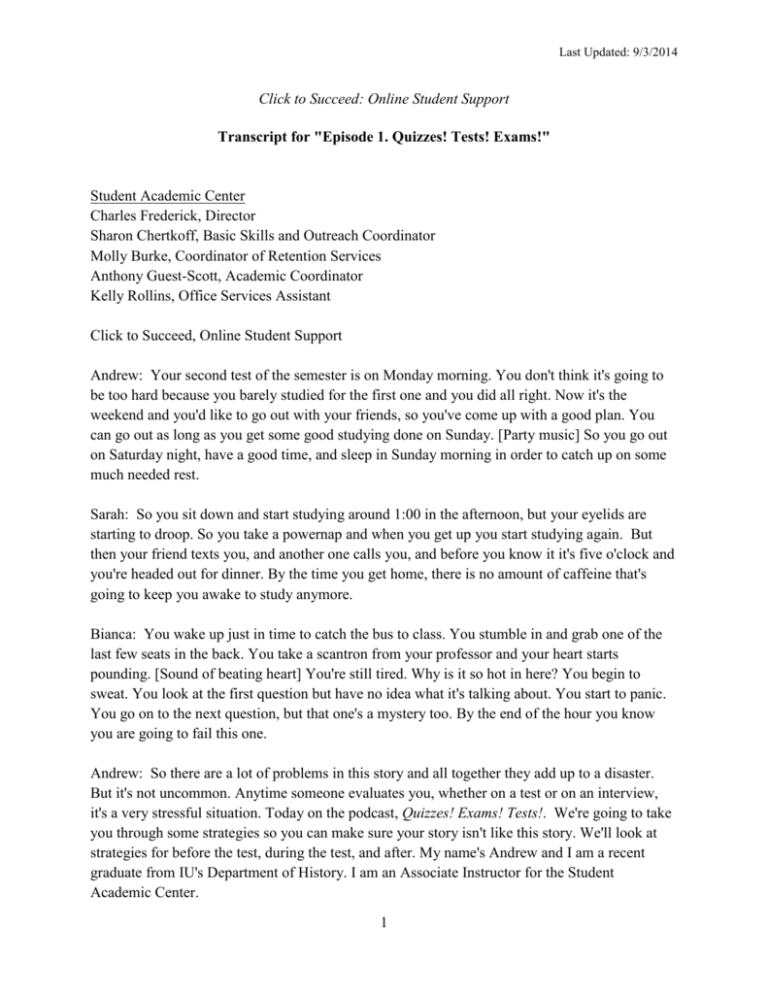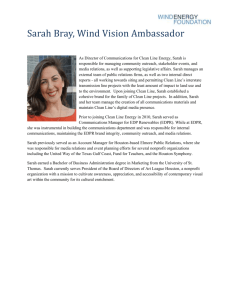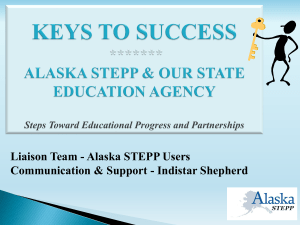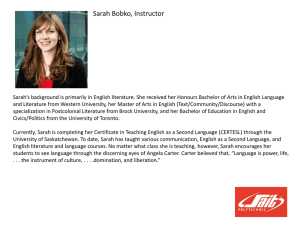
Last Updated: 9/3/2014
Click to Succeed: Online Student Support
Transcript for "Episode 1. Quizzes! Tests! Exams!"
Student Academic Center
Charles Frederick, Director
Sharon Chertkoff, Basic Skills and Outreach Coordinator
Molly Burke, Coordinator of Retention Services
Anthony Guest-Scott, Academic Coordinator
Kelly Rollins, Office Services Assistant
Click to Succeed, Online Student Support
Andrew: Your second test of the semester is on Monday morning. You don't think it's going to
be too hard because you barely studied for the first one and you did all right. Now it's the
weekend and you'd like to go out with your friends, so you've come up with a good plan. You
can go out as long as you get some good studying done on Sunday. [Party music] So you go out
on Saturday night, have a good time, and sleep in Sunday morning in order to catch up on some
much needed rest.
Sarah: So you sit down and start studying around 1:00 in the afternoon, but your eyelids are
starting to droop. So you take a powernap and when you get up you start studying again. But
then your friend texts you, and another one calls you, and before you know it it's five o'clock and
you're headed out for dinner. By the time you get home, there is no amount of caffeine that's
going to keep you awake to study anymore.
Bianca: You wake up just in time to catch the bus to class. You stumble in and grab one of the
last few seats in the back. You take a scantron from your professor and your heart starts
pounding. [Sound of beating heart] You're still tired. Why is it so hot in here? You begin to
sweat. You look at the first question but have no idea what it's talking about. You start to panic.
You go on to the next question, but that one's a mystery too. By the end of the hour you know
you are going to fail this one.
Andrew: So there are a lot of problems in this story and all together they add up to a disaster.
But it's not uncommon. Anytime someone evaluates you, whether on a test or on an interview,
it's a very stressful situation. Today on the podcast, Quizzes! Exams! Tests!. We're going to take
you through some strategies so you can make sure your story isn't like this story. We'll look at
strategies for before the test, during the test, and after. My name's Andrew and I am a recent
graduate from IU's Department of History. I am an Associate Instructor for the Student
Academic Center.
1
Last Updated: 9/3/2014
Sarah: My name's Sarah. I'm a PhD student in the Folklore Department here at Indiana
University and an Associate Instructor at the Student Academic Center.
Bianca: My name is Bianca. I'm a Journalism student here at IU and I'm a peer instructor for the
Student Academic Center.
[Music]
Part 1: Before - Preparation
Anthony: We'll start with preparation before the quiz, test, or exam. To prepare, you need to first
make sure you have the best attitude. Next, you need to define and schedule it. Third, you need
to study and practice. And finally, you need to take care of yourself. I'm going to turn it back
over to Drew, Sarah, and Bianca now to tell you a little more about that.
1. Attitude
Sarah: Step one is attitude. What do you feel and think you know about tests? And what's the
point of testing anyway?
Bianca: Tests aren't about memorizing pat answers, spitting them out, and then forgetting them.
That's short-term thinking and it misses the point. What they ought to be about is solidifying
your knowledge for the long term. When you think about tests this way they become an
opportunity.
Andrew: That's right. An opportunity to show what you've really learned. I mean, think about
every athlete who practices before they step out onto the field. All that practice, dedication and
hard work has to translate into real results. A test is the same way. Your preparation and hard
work needs to translate into your results. When you think about it this way, it's a way to prove
what you've learned and what you know. So when it's test time, really, it's show time.
Sarah: Right. The more mental sweat you put into really making sure that information is dug
into your brain, the better it's going to be anchored in your mind when test time rolls around.
Bianca: So start thinking about tests this way. Who knows? You might even start to enjoy them.
2. Define and schedule it.
2
Last Updated: 9/3/2014
Andrew: Step two is to define it and schedule it. There are a whole host of questions that you
need to find out about your test in order to best be prepared for it. For example, what role does
your test play in the class, how many points is it worth, and how much of your final grade is
dependent upon this test?
Sarah: You also need to know what's going to be on the test. Is it cumulative, or does it only
cover the material that's been new since the last exam?
Bianca: How long will you have to take it?
Andrew: What kinds of questions are going to be on this test and how many of each kind?
Sarah: What does your instructor suggest is the best way to practice for it?
Bianca: Now that you've answered these questions, you are ready to make your own study
guide. Check out the template on the blog. It's got columns where you can list each concept,
skill, or source you need to study, what you need to know about it, what to study to figure that
out, and important examples that might accompany it. Fill this out and look it over. Once you've
done that, there's a space at the bottom where you can estimate the amount of time you'll need to
learn that material.
Andrew: Now that you have your study guide, it's time to schedule it. The important thing to
remember here is that it is best to break it up into manageable chunks. Research tells us that the
worst type of studying is to try to do it in one large session, or even worse, to try to cram it all in
the night before.
Sarah: It can also be really helpful to have a couple of different places where you do your
studying. Studies have shown us that our memories are really, really powerfully connected to the
place that we were when we first made them. Have you ever had a conversation with somebody
and then when you try to remember it later you find you can remember exactly where you were
standing at the time? You can take that same principle and apply it to your studying. When you
sit down at test time to try to remember information, it can help to think about where you were at
the time you were studying that stuff.
Bianca: So experiment and find a few different study places that work for you.
Andrew: Finally, you should try to vary the type of studying that you're doing within each
session. Much like an athlete will have strength training, agility training, and also skill training
all in one practice, so, too, should you have various types of studying in one session. In this way
you'll break up the monotony and also create a deeper impression.
3
Last Updated: 9/3/2014
3. Study and practice.
Sarah: So you know what's on the test and you've got a study plan ready to go. Now it's time for
step three: actually sitting down, studying, and practicing.
Bianca: It's like professional golfer Jerry Barber said, "The more I practice, the luckier I get."
You've got to work with the material, and to do it well, remember this: study in the way you'll be
tested.
Andrew: So let's talk question types. We're going to group these into three different levels.
Level one includes true/false, matching, multiple choice, and fill in the blank. All of these
questions ask you to recognize and produce the right answers from among similar choices.
What's the best way to study for them?
Sarah: Start with the list of the "nouns" in your study sheet. That includes people, places, and
things like historical periods, events, concepts, and ideas. Drilling with flash cards is a
phenomenal way to remember this kind of information. And there are a million different apps
and websites - many of them are totally free - that you can use to help with this. Quizlet's a
favorite of mine. Or you can keep it simple, grab some index cards and a pen, and just do it that
way.
Bianca: And while repetition is useful, sometimes you can go round and round and not feel like
things are sinking in. That's where you might want to turn to the concept of elaborative encoding.
Andrew: There are two kinds of elaborative encoding. The first uses mnemonic devices like
acronyms. Think H-O-M-E-S, "homes," for America's five Great Lakes.
Sarah: The second uses linking strategies like the memory palace. This is where you create a
space or a story that links together what you are trying to remember. And to make the
information more memorable, you twist an image of each item in your mind into something
exaggerated, bizarre, or ridiculous - anything that'll make it stand out. This makes it easier to
remember later.
Bianca: Let's move on to level two questions which include identification, definition, and short
answer. For the ID and definition questions, you'll need to be able to identify what a term or
concept is by explaining to what larger category or grouping it belongs to, and what makes it
different from other members of that category.
4
Last Updated: 9/3/2014
Andrew: Short answer questions will build on this basic knowledge, maybe asking how all these
terms fit together, how they compare and contrast, and what they help explain.
Sarah: So what's the best way to prepare for these questions? You could certainly start by
memorizing definitions for the ID questions. Then, for the short answers, sort out your notes on
lectures and readings, and reorganize them. Use them to create summaries, outlines, timelines, or
charts. Anything that'll help you sort information, and connect the pieces together into bigger
patterns, groups, issues, and questions.
Bianca: And that brings us to level three: essay questions. For these, you might need to apply an
idea to new evidence: the top-to-bottom approach. You might also be asked to take raw data and
use it to create an argument: the bottom-up approach. In both cases you'll need to create a unique
argument based on evidence. When you do that, you have to make the case for your ideas by
showing, not telling. So how do you get ready for this kind of question?
Andrew: You can start by creating mind-maps or outlines of all the big ideas you've talked about
in class with details plugged into them. You can also try linking this with real world examples of
your own. At this level of thinking you're looking for both the forest and the trees: the big picture
and the supporting examples of evidence.
Sarah: Okay, so you've got some ideas about how to study for different kinds of questions. A
couple of final words on studying: first, make sure to test yourself. Make practice problems,
questions, quizzes, talk about it with a friend or your family. As Mark Twain said, "If you can't
explain it to a six year old, you don't really know it yourself."
4. Take care of yourself.
Andrew: Step four is to take good care of yourself. Remember to conclude your studying the
night before in plenty of time for you to get good rest. And the day of your test, eat good meals
regularly.
Sarah: Limit your caffeine intake, remember to take any medication that's been prescribed to
you, but don't take anything that hasn't been prescribed to keep you awake or to help you focus.
The downsides of doing that are way worse than any benefit you might think you're going to get.
Part 2: During - Execution
Anthony: Okay. So we've covered what to do to prepare before your quiz test, or exam, so
you're ready for that. Now let's turn to your actual performance at test time. To do your best, you
5
Last Updated: 9/3/2014
need to keep your anxiety in check, use some effective strategies, and do your own work. Let's
first talk about test anxiety.
Anthony: Hi I'm here with Dr. Brad Stepp, a psychologist at the Counseling and Psychological
Services Center here at Indiana University. And CAPS is located in the IU Health Center. So
welcome, Dr. Stepp, I appreciate you being with us today.
Dr. Stepp: No problem. Thanks for having me.
Anthony: Sure. And we're going to be talking about test anxiety.
Dr. Stepp: Yes.
Anthony: So the basic question I think we need to start with is how do you define test anxiety what is it, and what does it feel like?
Dr. Stepp: Test anxiety is usually any negative emotional state or negative physical state
associated with a panic response when one is taking an exam. So symptoms of that may include
racing heartbeat, racing thoughts, sweaty hands, feeling very hot or very cold, things along that
line.
Anthony: Okay. And when you're not actually taking a test, you know, before you get to your
test, what are some things you can do to manage text anxiety?
Dr. Stepp: So some things that I have students do, that I work with who suffer from test anxiety,
are regular practice of mindfulness techniques, or relaxation techniques such as progressive
muscle relaxation, meditation, visualization exercises, deep breathing techniques.
Anthony: Mm-hm. Can you talk a little more about mindfulness? What is that exactly?
Dr. Stepp: So mindfulness is an area that has… a lot of interest has grown around that area in
the field of psychology. So a lot of the studies have shown that it can be quite effective in
helping people deal with negative emotional states, anxiety, it helps people alleviate some
chronic pain that they may be dealing with. Regular practice of mindfulness techniques has great
effects on all of those things.
Anthony: Hm. You know, one of the things I like about the idea of mindfulness is that it
emphasizes this whole outside-in kind of approach to the way the body and the mind work, so
what you're thinking and feeling inside is directly affected by what's happening to you physically
as well.
6
Last Updated: 9/3/2014
Dr. Stepp: Right. I think a lot of times we forget just how connected our mind and body are to
one another. So our mind affects the body and our body affects our mind as well. So I agree with
you completely.
Anthony: Mm-hm. You know, when you're actually in a test, I think one of the things that
happens to students is this snowball effect.
Dr. Stepp: Mm-hm.
Anthony: So, where, you know, you start to think about how the test is going and that effects…
oh no, now I'm going to fail the test, now I'm going to fail the class, now that's going to prevent
me from getting into the program, or school, or graduate school I want to get into. And then it
creates this kind of negative feedback loop/cycle.
Dr. Stepp: Mm-hm. It's all part of that cycle and that's what can make test anxiety so threating, I
feel like, and such a big problem for a lot of students. It's that once we're in that feedback loop,
or that cycle of that snowball effect that you were speaking of, it's hard to get out of it. And those
techniques that I mentioned before really helps break that cycle in the moment, which is really
important when you're dealing with any form of performance anxiety. It's breaking that cycle.
Anthony: Okay. So it sounds like there are some things you can do before the test, to prepare
regularly, there are some things you can do during the test, to deal with an actual attack at that
moment.
Dr. Stepp: Certainly.
Anthony: So one of the things we talk about in this episode is the fact that when you break up
your study sessions into smaller units, and spread them out over time instead of trying to do it all
the night before, or, you know, five hours a couple days before, that you actually retain the
material better. So it may be that adding some kind of regular practice of managing stress to your
study session might be a good idea.
Dr. Stepp: Certainly, I think it's a great idea. So just making it as much a part of your study
routine as going to the library or working outside - wherever you feel most comfortable, making
it a part of your routine. Again, breaking that cycle of panic is really important.
Anthony: Where could someone learn about some these techniques and how to use them?
7
Last Updated: 9/3/2014
Dr. Stepp: You could go to Google or YouTube, search for relaxation techniques or mindfulness
practices. We also offer mindfulness practice sessions here at the counseling center on a regular
basis, and students can call for more information on those if they would like. And those are free
to IU students.
Anthony: Great, great. Well if there's one idea about test anxiety you'd like students to leave
with from this interview, what would that be?
Dr. Stepp: Probably that, well, two things: one, it can be treated. I work with students, many
students, every year who overcome test anxiety; and two, you can be prepared. And being
prepared not only involves studying for the exam so you actually know the material - that's a big
part of it - but also being prepared by engaging in regular mindfulness or relaxation practices. I
think those two things are ways in which people can deal with test anxiety.
Anthony: Great. Well, Dr. Stepp, I appreciate you being here with us today and taking your
time.
Dr. Stepp: My pleasure.
Anthony: Thanks very much.
Andrew: Now let's talk test-taking strategies.
Sarah: First, get in the zone. Arrive early, locked-in, focused, ready to go. Resist the urge to do
any last minute studying; at this point you know it or you don't. As Teddy Roosevelt said, "Do
what you can, with what you have, where you are."
Bianca: Second, listen for special instructions from your professor. Write your name on your
exam and on all scrap paper.
Andrew: Third, preview the exam. Figure out exactly how much time to spend on each question.
What do you know and what are you fuzzy about? You may want to get the easiest ones out of
the way first and get to the harder ones later. Or, you might do the hardest ones first to give them
the most time, knowing that you can rush through the rest of the test pretty quickly if need be.
Your call. Both approaches are valid.
Sarah: Fourth, read each question carefully. Know exactly what each question is asking for and
ask for clarification from the instructor if you need it.
8
Last Updated: 9/3/2014
Bianca: Fifth, approach answering each type of question differently, just like you did when you
were studying.
Andrew: For true/false, the main question is whether or not you can prove the statement false.
Here the devil is often in the details. Is any part of the statement untrue? There could even be a
single word that makes it true or false. For example, instructors frequently use absolutes like
"always" and "never" to make statements false and they often use qualifiers like "sometimes" or
"ordinarily" to make them true.
Sarah: For multiple choice and matching, it helps to think of the answer on your own before
even reading over the choices. Then use a process of elimination. For multiple choice you can
even think of each answer as its own true/false question. Watch for those specific words that
separate the best answers from the almost best answers.
Bianca: For short answer and essay, make sure you first read every part of the question. Then
zero in on the verb. You'll see terms like "analyze," "compare," "explain," and "interpret." For
essay questions, before you start to write, quickly outline what you're going to say. Make sure
you've got a topic sentence, thesis statement, or primary argument. Back it up with supporting
examples. Whenever possible, use specific details and terminology from the class. Be sure to
conclude your essay, just like you would a paper.
Andrew: Finally, save time to review at the end. There's no prize for turning your paper in first
and there's nothing more heartbreaking than losing points on a test for careless mistakes when
you really knew the material.
Part 3: After it's Over
Anthony: After you get the answers back from your quiz, test, or exam, go over them and
correct them. Make sure you figure out what you did wrong and why. You might need to
reassess your study plan if it didn't go so well this time. And even if your professor does not go
over this in class, make sure you go to office hours and get these answers, or talk to other
students and get them. You might see these same questions on a future exam. Okay. I'm going to
turn it back over now to Drew, Sarah, and Bianca for the takeaways.
The Take-Aways
Andrew: So remember, before the test, set yourself up to succeed. Prepare yourself as best you
can, find out about the test and all of its details, study generally and also specifically, changing
the venue and also changing the amount of time that you're spending doing that studying, try not
to cram, and also take care of yourself. Get plenty of sleep, and eat good food.
9
Last Updated: 9/3/2014
Sarah: During the test, get control over your anxiety. Have a strategy for each kind of question.
Bianca: After the test, get the right answers and find out what mistakes you made. Now you're
ready for next time.
Co-Hosts
Andrew M. Koke
Sarah Gordon
Bianca Lev
Boom Operator
Amber Girven
Scripts, Videography, Editing, and Original Music
Anthony Guest-Scott
Additional Media
Scene from Spinning Levers (The Jam Handy Organization, 1936), sponsored by the Chevrolet
Division of General Motors Corporation, courtesy of The Internet Archive
Quizlet.com
Stock.XCHANGE
VideoBlocks.com
Produced By
The Student Academic Center, Office of the Vice Provost for Undergraduate Education
© Copyright 2013 The Trustees of Indiana University. All Rights Reserved.
The Student Academic Center
Great Teachers. Small Classes. Real Help.
10







